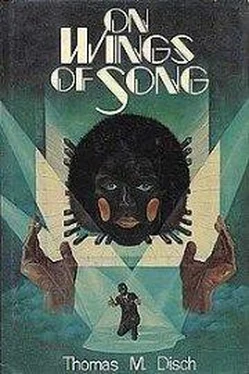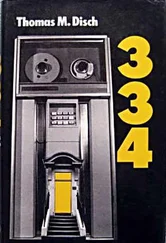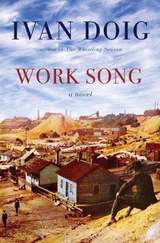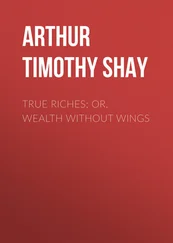There was more talk, along less divisive lines, and even some laughter. Serjeant so far overcame his shyness (not of Daniel but of his father) as to tell a droll and fairly scathing story about his analyst’s extra-marital difficulties. Boa insisted on telling about Daniel’s moment of glory in Mrs. Norberg’s class, and made it sound a much larger moment than it had been. Then, as the talk began noticeably to flag, a servant came in to tell Mr. Whiting that he was wanted on the telephone, urgently, by Miss Marspan.
Grandison Whiting excused himself.
A moment later Serjeant took his leave.
“Well,” said Boa eagerly, “what do you think?”
“About your father?”
“He’s incredible, isn’t he?”
“Yes. He is incredible.” That was all he said, nor did she seem to require more.
The snow had continued steadily through the afternoon. It was arranged that Daniel would ride home in the next car going in to town. He had only a twenty-minute wait at the gatehouse (with a different and much friendlier guard on duty), and there was the further good luck that his ride was in a pick-up in the back of which he could put his bicycle.
At first Daniel couldn’t understand why the driver of the truck was glaring at him with such a degree of unprovoked ill will. Then he recognized him: Carl Mueller, Eugene’s brother, but more to the point, Roy Mueller’s oldest son. It was common knowledge that Carl worked at Worry, but in all his daydreams since he’d started being a friend of Boa Whiting Daniel had never indulged in this one.
“Carl!” he said, slipping off a mitten, holding out his hand.
Carl glowered and kept both gloved hands on the steering wheel.
“Carl,” Daniel insisted. “Hey, it’s been a long time.”
The guard was standing by the open gate, above which a lighted sign commanded them still to WAIT. He seemed to be watching them, though against the dazzle of the truck’s headlights this small contest must have passed unwitnessed. Even so, Carl appeared to have been unnerved, for he conceded Daniel the acknowledgement of grimace.
WAIT changed to PASS.
“Christ, this is some snowstorm, isn’t it?” Daniel said, as they moved ahead in second gear along the path that Worry’s own plows had cleared not long before.
Carl said nothing.
“The first real blizzard of the year,” he went on, twisting sideways in his seat so as to look directly at Carl’s stony profile. “Will you look at it come down.”
Carl said nothing.
“He’s incredible, isn’t he?”
Carl said nothing. He shifted to third. The truck’s rear end swayed on the packed snow.
“That Whiting is incredible. A real character.”
With a slow unsymmetrical rhythm the wipers pushed the wet snow off to the sides of the windshield.
“Friendly, though, once he puts aside his company manners. Not that he ever lets it all hang out, I suppose. You’d know that better than I. But he does like to talk. And theories? More theories than a physics textbook. And one or two of them would set a few people I know back on their fat asses. I mean, he’s not your average run-of-the-mill fiscal conservative. Not a Republican in the grand old tradition of Iowa’s own Herbert Hoover.”
“I don’t know what you’re fucking talking about, Weinreb, and I’m not interested. So why not just shut the fuck up, unless you want to ride that bicycle the rest of the way to town.”
“Oh, I don’t think you’d do that, Carl. Risk a swell managerial position like yours? Risk your exemption?”
“Listen, you god-damn draft-dodger, don’t talk to me about exemptions.”
“Draft-dodger?”
“And you fucking well know it.”
“As I see it, Carl, I performed my service to God and country at Spirit Lake. And while I’ll admit I’m not exactly anxious to go off to Detroit and protect the good people of Iowa from dangerous teen-agers, the government knows where I am. If they want me, all they have to do is write and ask.”
“Yeah. Well, they probably know what they’re up to, not drafting shits like you. You’re a fucking murderer, Weinreb. And you know it.”
“Up yours, Carl. And up your fucking father’s too.”
Carl stopped, too suddenly, on the brake. The truck’s back wheels sloughed to the right. For a moment it looked like they’d do a complete spin, but Carl managed to ease them back on course.
“You put me out here,” Daniel said shrilly, “and you’ll lose that fat job tomorrow. You do anything but take me to my front door, and I’ll have your ass for it. And if you think I can’t, just wait. Just wait anyhow .”
“Chickenshit,” Carl replied softly. “Chickenshit Jewish cocksucker.” But he took his foot off the brake.
Neither said any more till the truck pulled up in front of the Weinreb house on Chickasaw Avenue.
Before getting out of the cab Daniel said, “Don’t pull away till I’ve got my bike out of the back. Right?”
Carl nodded, avoiding Daniel’s eyes.
“Well, then, good-night, and thanks for the lift.” Once more he held out his hand.
Carl took the offered hand and grasped it firmly. “So long, murderer.”
His eyes locked with Daniel’s and it became a contest. There was something implacable in Carl’s face, a force of belief beyond anything that Daniel could ever have mustered.
He looked away.
And yet it wasn’t true. Daniel was not a murderer, though he knew there were people who thought he was, or who said they thought it. In a way Daniel rather liked the idea, and would make little jokes to encourage it, offering his services (in jest) as a hit man. There has always been a kind of glamor in the mark of Cain.
The murder had taken place shortly after Daniel’s release from prison. The father and older brother of his friend Bob Lundgren had been forced off the road on their way back from a co-op meeting, made to lie flat in a ditch, and shot. Both bodies had been mutilated. The stolen car was found the same day in a parking lot in Council Bluffs. The assumption was that the two murders were the work of terrorists. There had been a rash of similar killings all through that winter and spring, and indeed for many years. Farmers, especially undergod farmers, had many enemies. This was the main reason, behind the proliferation of fortress-villages like Worry, for despite their sponsors’ claims they were not provably more efficient. Only safer.
The murders had taken place in April, three weeks before Bob Lundgren was scheduled to be paroled from Spirit Lake. Considering the repeated threats he’d made against both victims, it had been fortunate for Bob that the murders had preceded his release. As it was, people assumed that he’d hired someone to do the work for him — some fellow prisoner who’d been let out ahead of him.
The reason that Daniel in particular had come under suspicion was that the following summer he’d gone to work for Bob, supervising large work-crews of convicts from Spirit Lake. It was a fantastic summer — fraught with tension, filled with pleasure, and highly profitable. He’d lived in the main farmhouse with Bob and what was left of his family. His mother stayed upstairs, locked in her bedroom, except for sporadic forays into the other rooms, late at night, when she would break up the furniture and call down the wrath of God. Bob finally had her sent off to a rest-home in Dubuque (the same one Mrs. Norberg had gone to). That left his brother’s widow and her twelve-year-old daughter to take care of household matters, which they did with a kind of zombie-like zeal.
Every weekend Bob and Daniel would drive up to Elmore or one of the other border towns and get thoroughly sloshed. Daniel got laid for the first time in his life, and for many times besides. As an ex-convict (and possibly a killer) he was generally left to himself by men who would otherwise have gladly kicked shit out of him.
Читать дальше












